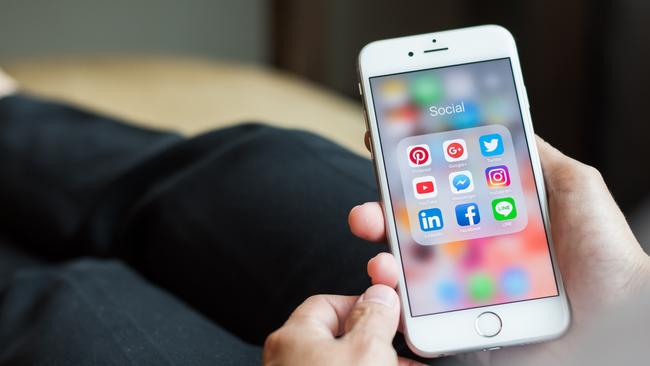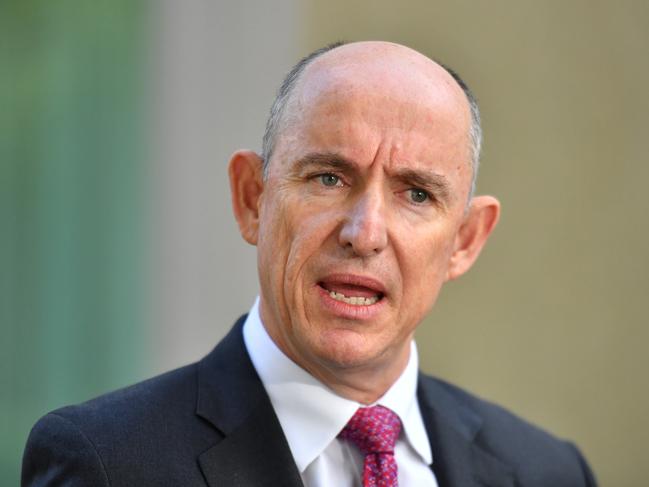Coronavirus contact-tracing app to help set us free
A new tracking app is likely to be available in Australia within weeks, offering faster tracing of COVID-19 contacts.

A new tracking app is likely to be available in Australia within weeks, offering faster tracing of COVID-19 contacts and a potential early release from economically crippling social restrictions.
Development of the opt-in mobile phone app, based on one used in Singapore, is being led by the nation’s Digital Transformation Agency with the backing of Scott Morrison and input from Attorney-General Christian Porter.
The Australian can also reveal the nation’s top telcos – Telstra, Optus and Vodafone – have contacted the government offering to boost contact-tracing capabilities using metadata they collect under national security legislation. It is understood the Home Affairs Department was initially involved in the app project, but the task was handed to the DTA – under Government Services Minister Stuart Robert – after the agency’s success in delivering a WhatsApp coronavirus information service with software company Atlassian.

The app, which will use the source code for Singapore’s TraceTogether software, will allow health authorities to alert Australians if they have come close to positive COVID-19 cases by using mobile phone Bluetooth data, which record digital “handshakes” with other phones.
Better use of technology is viewed by authorities as critical to getting on top of the virus. But the government is highly sensitive to the civil liberties implications, and is working with the Privacy Commissioner.
Chief Medical Officer Brendan Murphy confirmed the development of a Singapore-style app – one of several options under consideration – in evidence to the New Zealand parliament’s epidemic response committee.
“We’re very keen to use and use it – perhaps even more extensively than Singapore,” he said. “There’s a conversation to have with the community about the acceptability of it. We think that idea, the TraceTogether app, is a really excellent one if you’ve programmed it properly and got the right community buy-in.
“We’re actively looking at that as part of a measure that might be used to … consider some relaxation of (social-distancing) measures.”
The government is hoping for a minimum domestic take-up of the app of around 40 per cent to assist in COVID-19 contact tracing, currently done manually. The Singapore model, to date, has a take-up of around 20 per cent.
The app, which would help governments map a path for the potential scaling back of strict social-distancing measures, would work in tandem with ramped-up testing and existing tracing measures.
The use of metadata collected by telcos under the Telecommunications Data Retention Act 2015 – highly controversial when it was introduced – is a possible next step.
The Australian has been told the telcos are prepared to make adjustments to data they normally retain, to enable better contact tracing. But it’s understood the government is wary of how the measure would be received by the public.
Former federal cyber security chief Alastair MacGibbon said Australians had already “crossed the Rubicon” of enforced social isolation, making it a relatively smaller step to consent to greater electronic monitoring to tackle COVID-19.
“You’d probably transgress far fewer civil liberties by using electronic data – something Australians trade off every day with the multinationals anyway – for the purposes of increasing physical liberty,” he said. “So as we take the foot off that (social-isolation) brake, we might need to increase electronic monitoring.” The former Australian Cyber Security Centre head said use of technology needed to be “reasonable, proportional, time-bound and practical”.
Australian Strategic Policy Institute Cyber Policy Centre director Fergus Hanson said it was sensible to harness technology, “but the detail really matters”. “Done badly, the dataset could be abused – for example, to discriminate against people. Done well, it could save lives by making contact tracing much more effective and efficient. Some of the apps out there are better than others.”
Legal and privacy advocates have told The Australian that such measures, if implemented carefully, were an acceptable infringement on personal liberties given the coronavirus emergency.




To join the conversation, please log in. Don't have an account? Register
Join the conversation, you are commenting as Logout